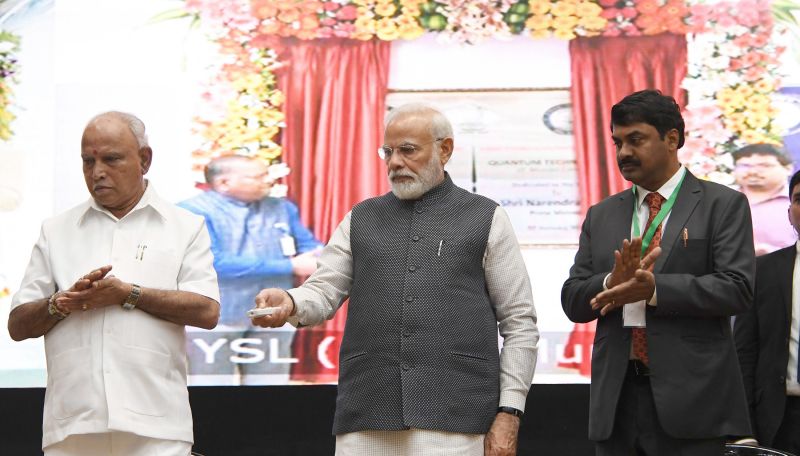PM inaugurates 5 DRDO young Scientist Labs
PIB, January 2

Prime Minister Shri Narendra Modi, on Wednesday, dedicated five Young Scientists Laboratories of Defence Research and Development Organisation (DRDO) to the nation. The ceremony was held in Bengaluru.
DRDO Young Scientist Laboratories (DYSLs) are located in five cities viz, Bengaluru, Mumbai, Chennai, Kolkata and Hyderabad. Each lab will work on a key advanced technology of importance to the development of futuristic defence systems viz, Artificial intelligence, Quantum technologies, Cognitive technologies, Asymmetric technologies and Smart materials.
The inspiration to start such laboratories came from the Prime Minister on the occasion of DRDO award function held on August 24, 2014. Shri Narendra Modi had then asked DRDO to empower the youth, by giving them decision making powers and challenging research opportunities.
Speaking on the occasion, Prime Minister Shri Narendra Modi said these labs would help in shaping the pattern of research and development in the field of emerging technologies in the country.
Prime Minister asked the scientists to prepare a definite roadmap for the new decade where DRDO should be able to set the direction and pace of scientific research in various fields in India.
Addressing the scientists, Prime Minister said India’s Missile programme is one of the outstanding programmes in the world. He also appreciated the Indian Space Programme and air defence systems.
Prime Minister said India cannot be left behind in the field of scientific research. He said the Government is willing to walk the extra mile with the scientific community so that it can invest time in emerging technologies and innovations for national security.
He said DRDO's innovations would play a huge role in strengthening programmes like Make in India and in promoting a vibrant defence sector in the country.
The establishment of the five DRDO Young Scientist Labs lays down the foundation for research and development of futuristic technologies. It will be a big leap forward for DRDO from the goal of making India self reliant to future ready in defence technologies.
The DYSL
DRDO has taken this important step of empowering youth for the purpose of achieving self reliance in the area of niche advanced technologies. This step lays down the foundation for research and development of futuristic technologies. Selected young scientists of DRDO, under the age of 35 years have been given this opportunity to work in identified research areas.
DRDO has identified five technology areas for these laboratories. The identified areas of work for these laboratories are Artificial intelligence, Quantum technologies, Cognitive technologies, Asymmetric technologies and Smart materials.
The DYSLs, are located at Bengaluru, Mumbai, Chennai Kolkata and Hyderabad. Each lab is working on a key advanced technology of importance to the development of futuristic defence systems. Research in the area of rapidly evolving Artificial Intelligence will be carried out at Bengaluru. The all-important area of Quantum Technology will be based out of IIT Mumbai. The future is dependent on Cognitive Technologies and IIT Chennai will house the lab embarking in this area of research. New and futuristic area of Asymmetric Technologies, which will change the way wars are fought, will be based out of campus of Jadhavpur University, Kolkata. The research in hot and critical area of Smart Materials and their applications will be based out of Hyderabad.
The Directors of these laboratories were selected independently by a committee chaired by Principal Scientific Advisor to Govt. of India. To realise the goals of these laboratories, Directors are empowered with Financial and Administrative authorities at par with any director of a DRDO laboratory.
Establishment of DYSLs for work on Advanced and Future technologies will be a big leap forward for DRDO from goal of making India Self Reliant to Future Ready in defence technologies.



